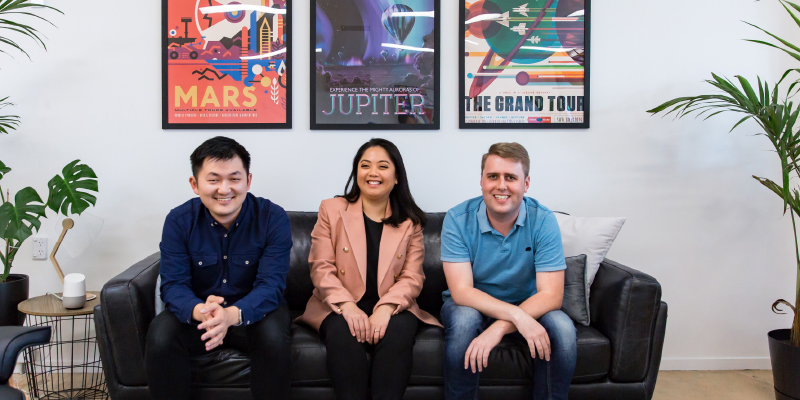It’s all good for businesses
China has Taobao, America has Amazon – now Kiwis are getting their own app-driven e-commerce marketplace…
China has Taobao, America has Amazon – now Kiwis are getting their own app-driven e-commerce marketplace, thanks to four university graduates. The goal is to take online buying and selling to a whole new level of easy.
They originally met while studying at the University of Canterbury. Now four young Kiwis are set to reinvent New Zealand’s e-commerce marketplace with their AllGoods platform and app.
Nathan Taylor (Masters in Linguistics), Levi Fawcett and Bradley Meredith (Bachelors in Mechatronics Engineering) and Mark Song (Bachelors in Chemical and Process Engineering) all share a common desire to modernise this country’s online buying and selling marketplace.
So where did the original concept for AllGoods come from?
“I’d spent time in China a couple of years ago, where I realised how far ahead e-commerce was there compared to New Zealand,” explains Nathan. “I’d known for some time that Levi was also very dissatisfied with the state of e-commerce in New Zealand, and had already been working on a new marketplace website.
“We began researching how we could develop a Kiwi marketplace that modernised the e-commerce experience.
“Levi is head of vehicle simulations at Rocket Lab and has been a part of Rocket Lab since its early days. Soon after, Bradley, who has a background in engineering, marketing and sales, along with Mark, who was running a creative design company, joined the founding team.”
Nathan describes the online marketplace in New Zealand as outdated – “expensive, clunky, and where users feel disconnected”.
“We could see countless examples overseas where buying and selling had modernised and become easy, free, and a totally normal part of people’s everyday life.”
The four founders soft-launched their website earlier this year. The focus over recent months has been on refining the AllGoods product based on user feedback. By the time they officially launched their website and app in November they already had 500 Kiwi businesses using the platform and more than 100,000 products listed.
AllGoods is a marketplace for both new and second-hand goods. Listing an item for sale on the mobile app is simply a case of taking a photo, adding a title, price and category.
“Buying is also simple,” says Nathan. “You can browse for items near you – filtering by distance – chat with the seller, and easily switch between new and second-hand listings.”
AllGoods is also the ideal solution for businesses, he says. “Store accounts receive their own customisable storefront, tools for managing inventory and orders, a built-in payment gateway for accepting credit/debit cards, built-in marketing system, and no listing limit.
“On top of that, businesses are automatically connected to our marketplace and can therefore sell directly to AllGoods users.”
AllGoods integrates with other platforms such as Shopify and Tradevine – allowing businesses already using these platforms to sync their inventory onto the AllGoods marketplace.
“It can all be done with one click, after which we keep price and stock in sync.”
The marketplace is 100 percent local, Nathan explains. “So buyers can be assured that their purchase will arrive quickly; they will receive Kiwi customer service and they won’t be hit with any unforeseen import charges.”
The platform borrows ideas from many of the successful overseas apps, such as Letgo in the US and Carousell in Singapore, and tailors them for the New Zealand market.
Not without challenges
Getting AllGoods to where it is today has not all been plain sailing. Nathan says their use of NativeScript, a “bleeding edge” technology, to build the platform was a challenge – purely because it is new and there is less information about it on the web.
The four founders have also learned that product development is only one small part of building a successful business. “Marketing, business development and management all play much bigger roles than we anticipated in the start-up journey,” says Nathan.
“We have also learned that businesses always need to be ready to shift focus and adapt in order to ensure that their product is a good market fit.”
Financial support for the business came from family and friends in the early days. Since then there’s been an external ‘seed’ round of private investment. The Christchurch start-up community has also helped in various ways – from marketing advice to help with applying for grants.
Today the business is preparing for its next round of investment and there’re already a number of interested parties and groups.
In terms of generating revenue AllGoods generally follows a ‘freemium’ business model, mirroring the business models of similar companies abroad.
“Our C2C second-hand marketplace is completely free for users to buy and sell,” explains Nathan. “Brand new (goods) listings, however, need to be sold by stores so businesses and regular online sellers can pay to upgrade to a store account. Store accounts come with additional advanced management and marketing features.”
He says a store subscription costs $4 per month and AllGoods charges a two percent commission fee on every successful sale.
The business model also includes revenue from paid on-site promotions. “A business can pay to advertise a product listed on AllGoods to interested customers,” says Nathan. “For example, users searching for couches in the second-hand marketplace could be recommended brand new couches from stores that had paid for the promotion.”
The journey so far
When Nathan, Levi, Bradley and Mark all graduated, AllGoods was not in their career plans. “We all sort of fell into it,” admits Nathan.
Looking back, they know they could have done things a little differently along the way.
“There were a lot of specific things we focused on early on because we were trying to please each and every person who came onto the site. With hindsight some of those things have not been worth the time and effort.”
If they had their time again they would get involved in the community sooner and access the resources and network earlier.
“We would have applied for grants and funds sooner,”
says Nathan. “We would have also focused heavily on app development earlier.”
But right now it’s full steam ahead to get the business up to speed, he says.
“In five years’ time we’d like to see AllGoods become the default place Kiwis go to when looking to buy something online. As is the case for many Chinese with Taobao and Americans with Amazon.”



